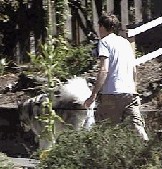 Dogs have been in the news lately — poisonings from tainted dog food and less than respectful treatment by a baggage handler. We have a lot of shared history with dogs. Dogs were once extremely valuable survival tools, used for the tracking of game, the herding of other domesticated animals, and most of all for the detection of dangerous predators, usually upright walking ones. That last use is still the most common. Modern burglar alarms have yet to emulate a dog’s keen sense of hearing and smell.
Dogs have been in the news lately — poisonings from tainted dog food and less than respectful treatment by a baggage handler. We have a lot of shared history with dogs. Dogs were once extremely valuable survival tools, used for the tracking of game, the herding of other domesticated animals, and most of all for the detection of dangerous predators, usually upright walking ones. That last use is still the most common. Modern burglar alarms have yet to emulate a dog’s keen sense of hearing and smell.
You can just look at a dog to see how we have altered their genes. But, how have they altered ours? The alterations have to be there, given so much intimate contact over so much time. I am going to hypothesize (as I have done way too many times before) that the good feelings many of us get from dogs are the result of selective pressure, implying once again that dog lovers may have had a slight reproductive advantage over a long period of time. What else could explain the intense attachment some people develop for their pet dogs? Similarly, both of my daughters developed strong attachments to soft fuzzy objects as small children (a blanket named DeeDee, still providing great pleasure, and a sheepskin named Woooly).
 Dogs, like everything else in this world, have an impact on the environment. A small lapdog has less impact than two large dogs. It is suspected that the elevated coliform bacteria counts found in many urban streams and lakes are the result of dog excrement. The food a dog eats comes from somewhere, is made of something, and took energy to make. Pet food sales in Europe and the U.S. amount to $17 billion annually. This is half of the estimated “one time” expenditure needed to purchase or lease enough intact ecosystems to protect 75% of the planet’s biodiversity, slowing the present extinction event to a crawl (my favorite use for hypothetical sources of money).
Dogs, like everything else in this world, have an impact on the environment. A small lapdog has less impact than two large dogs. It is suspected that the elevated coliform bacteria counts found in many urban streams and lakes are the result of dog excrement. The food a dog eats comes from somewhere, is made of something, and took energy to make. Pet food sales in Europe and the U.S. amount to $17 billion annually. This is half of the estimated “one time” expenditure needed to purchase or lease enough intact ecosystems to protect 75% of the planet’s biodiversity, slowing the present extinction event to a crawl (my favorite use for hypothetical sources of money).
Dogs are also used as status symbols. Scrawny mutts have much less status than big pedigreed dogs. The vast majority of dogs in first world nations have lost their utilitarian usefulness and are now essentially companion animals, feeding endorphins to our brains for no real return on investment other than those good feelings. Essentially, these dogs have become feel-good drugs, and in some cases can even act as effective antidepressants. But, is that a good use for a dog?
Many of these “feel good” dogs live miserable lives. I personally know of several dogs that spend eight to ten hours a day, five days a week trapped in a house or apartment all alone. These dogs are undeniably ecstatic when their owners return, and well they should be considering the sensory depravation they have just endured. They are all fed a single bowl of dried dog food once a day and must hold all bodily functions until taken out on a leash for a short time twice a day where they are allowed to crap in a planter strip. Even dogs that are allowed outside in small fenced backyards are no better off, and possibly worse off, than a typical caged zoo animal. Dogs, like us, are social animals.
In stark contrast, the dogs of rural Costa Rica live regal lives. I recall one little mutt whose favorite chew toy was a car-flattened, sun-dried cane toad. These dogs may live shorter lives than their U.S. counterparts, but they are dog’s lives. They eat a rich, flavor-packed variety of table scraps, get to “go” whenever they please, and sniff other dogs’ butts with abandon.
There is something irrational, even perverse, about the way we in the U.S. treat our dogs. Our tendency to anthropormorphize them greatly extends, yet at the same time greatly degrades, their quality of life. Striving to adopt out every dog that ends up in an animal shelter is irrational and may well stem from a subconscious attempt to quell our own anxiety about our own inevitable demise. Dogs clearly have the cognitive capacity to feel pain, loneliness, and boredom. They do not, however, have the capacity to worry about their future demise and all the pain and suffering that it will entail. That particular curse is a uniquely human one and can motivate us to do many strange things.
 Dogs have been in the news lately --
Dogs have been in the news lately -- 
